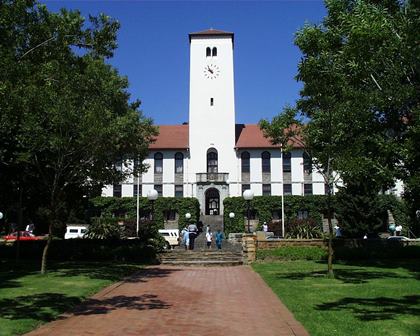More Rhodes University students are to be invited to return to campus, after the country moved to lockdown level 2.
“The… approach to allowing more students back on campus will be carefully balanced with important contextual factors. In particular, due consideration will be given to the capacity of health care services in the Makana local municipality to deal with any potential upsurge in Covid-19 infection cases,” Vice Chancellor, Dr Sizwe Mabizela said.
This follows an announcement by the government to move the country to Alert Level 2 of its Risk-Adjusted Strategy to manage the Covid-19 pandemic. Mabizela said the University placed a high priority on the safety, health and well-being of students, staff and the surrounding community. The University’s capacity to accommodate students in the residence systems within the applicable restrictions, social justice and a commitment to save lives while saving the academic year were among the key factors it would take into account.
In line with the directives of the Department of Higher Education & Training, the University will prioritise:
- First year students
- Students who rely on printed study materials and students whose social environments may not be conducive to optimum learning.
- Students identified by their departments as requiring access to facilities (i.e. laboratories, technical equipment and studios) for connectivity and/or to conduct experiments.
- Post-graduate students for whom online resources are not adequate to aid their progress.
All returning students will undergo a 10-day quarantine period in a secluded residence. During this period, contact with the students who are already in residences will be prohibited.
All students will be required to wear a face mask in public places and practice safe physical distancing. The University will take disciplinary action against any person who fails to abide by all the rules, regulations and protocols that have been put in place to safeguard the health and well-being of all students, staff and the local community. A general alcohol ban remains in force across campus and social gatherings are strictly forbidden.
Return to campus, however, does not mean an immediate return to in-contact or face-to-face teaching.
“Students will utilise student WiFi to participate in online teaching and learning while progression to blended teaching is phased in as the risk subsides. Return to campus will be by invitation only. No student without a permit will be allowed on campus. The institution will not be able to invite back every student in the categories prioritised by the DHET, since that would exceed the quota permitted by the Level 2 regulations,” Mabizela said.
The University encouraged all students who could participate meaningfully and productively in the remote learning programme from home to remain and continue to use the online system.
There have been 48 cases reported of Covid-19 among staff members and six students since the start of lock-down; however, the situation on campus has been under control, Mabizela said.
“All six students and the majority of staff members made full recovery. No case of staff to student transmission has been reported.”
Protocols for daily operations include strict adherence to physical distancing, wearing of mask on campus, daily screening and restriction of access.
The University also reviewed its regulations including the Student Disciplinary Code, to tighten controls intended to mitigate the risk of transmission and spread of the virus. Rhodes University is one of 12 public universities that the Department of Higher Education and Training has deemed to be low-risk, given its state of readiness and operational indicators.
“The fantastic outcomes of the dispensations and work of the teams that we set up to manage the unprecedented situation on our campus can never be taken lightly. We cannot lower our guard at this stage. If we do, we run the real risk of reversing the tremendous gains made in the reduction of viral infections achieved at a huge economic and personal cost. Each decision we make and every action we take is a delicate balancing act between the needs of our students and staff, and those of the surrounding community in Makhanda and the successful completion of our academic year,” Mabizela said.
The University is gearing to scale up its mental health care services. Among other interventions, counselling training is to be offered to academic staff and mental health could be incorporated into curricula in the near future.
International students, for whom travelling is still restricted, are being supported through online resources, and will be accommodated upon their return in dedicated catch-up sessions.


